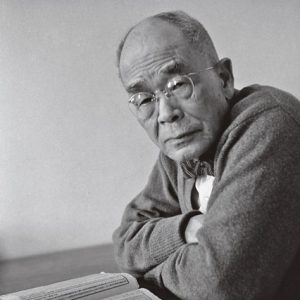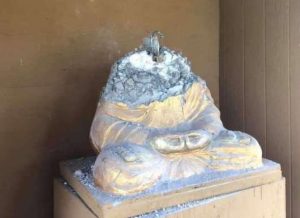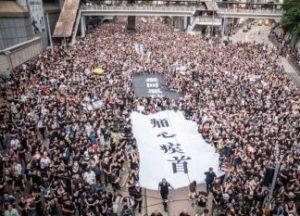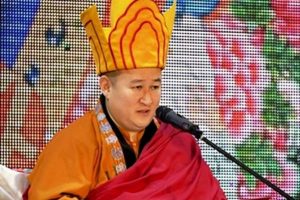
Vietnamese Buddhists at Hai An Pagoda in New Britain, Connecticut, will hold a week-long retreat and celebration on 10–17 October. In addition to conducting a variety of ceremonies and practices, they will take the opportunity to offer thanks to all those who have supported them over the years. The temple, which had its beginnings in 1975 as many Vietnamese fled their home country and resettled in the United States, has had many ups and downs over the decades but has found a home—and a welcoming community—in Connecticut.
The temple’s first congregants began meeting in people’s homes in the town of Bloomfield, 25 kilometers north of New Britain, in 1975. In 1978, local developer David Chase donated space in Hartford for a dedicated temple, and Hai An was born. Then, in 1995, they opened the pagoda on Cherry Street in New Britain.
The early development of the temple came as more refugees from Vietnam settled in the area and sought out community and opportunities to worship.
“We all want to have Buddhism. We all want to have a temple around us.” said Van Bang, secretary of the Buddhist Association of Connecticut and a long-time practitioner. “We want to keep our tradition with our religion. We don’t want to lose that. Our group carried this so that’s why we keep building the temple and with different people helping make it stronger until today. We have our temple there for 42 years.”

Bang was among the “boat people”—a wave of refugees who fled Vietnam by sea at the end of the US war in Vietnam. The exodus of Vietnamese began in 1975 as the US military left the country. The numbers reached a peak in 1978–79, but continued on for years after. Bang arrived with her family in 1981, when she was 17 years old.
Here family left Vietnam with just their “bare hands,” Bang said. “I get rescued by the oil rig in the open sea in the Thailand area.” (Hartford Courant)
Bang and her family remained in Thailand for some time, and also stayed in Indonesia and Singapore, before finally venturing to the US. “I don’t know if I die or I live on the open sea when I left my country,” Bang recalled. “That’s a gamble that we took.” (Hartford Courant)
Bang noted her gratitude to the US, where she has been able to earn three master’s degrees as she raised her family and freely practiced her religion.
The upcoming ceremonies will carry on the temple’s Pure Land tradition. To start each ceremony, a large bell and drum are played in a rhythm called Thinh Dai Hong Chung, (awakening for the people). At that time, the temple’s abbot, Ven. Thich Quang Phap, begins chanting while kneeling out of sight.
Ven. Thich Quang Phap described Buddhism as “like a road for you. Follow with your heart and we are stressed out enough.” (Hartford Courant)
The upcoming celebrations are scheduled to include several temples in the area, and more than two dozen monks, including one who is visiting from Vietnam. On 16 October, a special three-hour Trai Dan Chan Te ceremony will be held.
Prayers will be held for the community, as well as the broader Vietnamese community around the world. The participants will extend their prayers to those who did not make it and to those who lived desperate lives after the war.
“Lots of people lost their life on the street and nobody know[s] about it,” said Bang. “Lots of people, they escaped Vietnam by walking to Cambodia, to Laos and Thailand. So lots of people lost their life for no reason, unexpected, and no one helping them to pray for them. And this is part that we do for all.” (Hartford Courant)

All are welcome at Hai An Pagoda, where sutras are chanted on Tuesdays and Thursdays, and meditation is practiced with English guidance on Wednesdays. On Saturday, the “Great Compassion Mantra” to Quan Am (known also as Guanyin in Chinese and Kannon in Japanese) is chanted and as many as 100 people attend.
Read more
These Buddhists fled communist Vietnam. Now, in a temple in New Britain, they are celebrating decades in Connecticut. (Hartford Courant)
Hai An Pagoda (Facebook)
Related news reports from BDG
Buddhist Temple Offers Refuge to Vietnamese in Japan
Vietnamese Buddhists Bring Food Aid, Mental Health Support for Those Affected by COVID-19 in Melbourne
Vietnamese Buddhists in California and New York Manufacture Face Shields for Hospitals in Need
New Vietnamese Buddhist Temple Opens in Louisville, Kentucky
Vietnamese Buddhist Cultural Center in Czech Republic Honored with Provincial Status
Related features from BDG
Bodhisattva Quan Am’s Blessings, the Aesthetics of Devotion in a Vietnamese Temple in Maine
Reviving a Vietnamese Family Tradition – The Trantien Foundation












